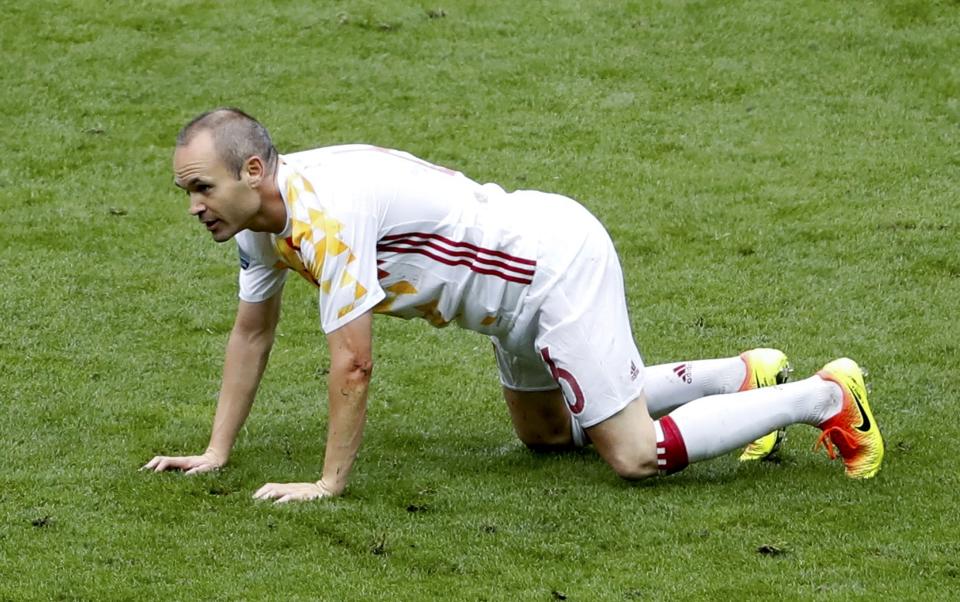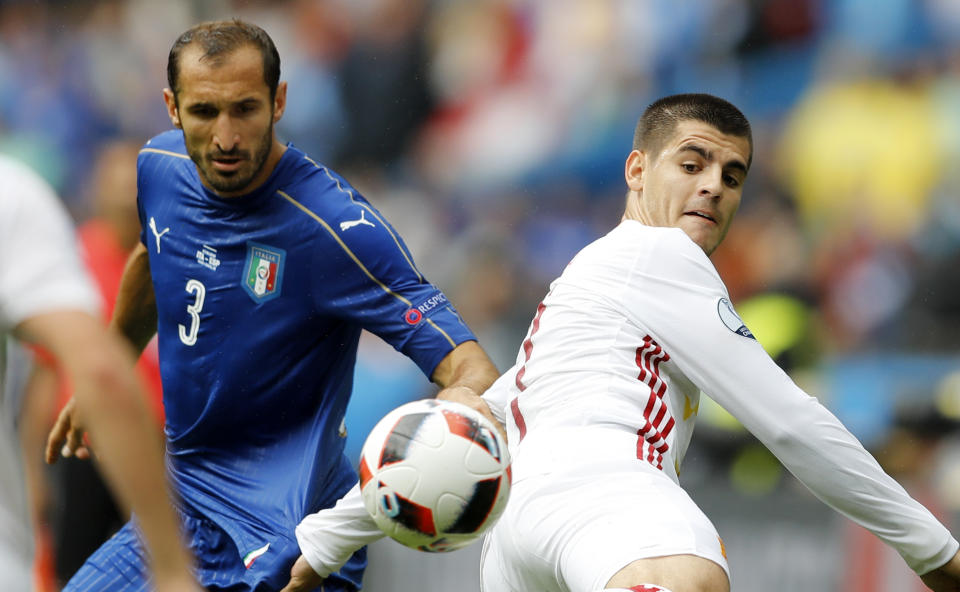How the greatest dynasty in international soccer came to an end

The end came much quicker than the beginning. But there was no mistaking it.
There at Euro 2016, on the damp, temperate pitch at the Stade de France, the greatest dynasty in international soccer history was laid to rest.
The Spanish side that lost 2-0 to Italy in the Round of 16 on Monday bore little resemblance to the team that had taken over the world the past decade. Some of the faces were the same, but their play was clunky instead of clinical, plodding instead of prodding. There wasn’t much furia, and it left them seeing roja, unable to break down the defensive fortress of positioning and technique the Italians have all but copyrighted.
[ EURO 2016 | Predictions | Scores/Schedule | Standings | Teams ]
The Spaniards used to break down everyone. If there was space, they’d take it. If there was concession, they’d accept it. If they had to pass one hundred times to create one chance, you had better get comfortable in your seat or go find something else to watch.
So what went wrong? And where does Spain go from here?
The answer to the former isn’t a huge mystery. Four players – a golden parallelogram, if you will – have allowed Spain to operate with unprecedented fluency and control, and two of them, Xavi and Xabi Alonso, retired from international competition in August 2014.
The diminutive, dynamic Xavi could well be the greatest midfielder of all time, blessed with a combination of vision, precision and patience wholly unencumbered by self-indulgence. Alonso, meanwhile, was arguably as complete a midfielder as the 21st century has seen – a composed steward who was adept at making plays when he had the ball and winning it back when he didn’t.
Together, along with spellbinding winger Andres Iniesta and sterling defensive mid Sergio Busquets, they helped Spain hum along from victory to victory, strangling opponents with their possession and opportunism.
Any national side would suffer the loss of such presences. That was clear at this European Championships when Spain leaned more on set pieces and the burgeoning touch of Alvaro Morata to finish second in Group D and reach the knockout stage.
But that’s no longer good enough. Fascism stagnated Spain’s national program in the mid-20th century, while the roads to subsequent major tournaments were paved with inconsistency and underachievement. That all changed in 2008, when Spain won the European championship for the first time in nearly 50 years. The Spanish then won their first World Cup at 2010 South Africa before successfully defending the continental crown two years later.
Those triumphs represented the payoff to an overhaul instituted by former national team manager Luis Aragones in 2006. Recognizing his squad wasn’t as physically imposing as the French side that had just eliminated it from the World Cup, or for that matter the other dominant nations at the time, Aragones adopted Barcelona’s tiki-taka strategy for the international stage.
By now, tiki-taka is a household tactic in world soccer. Incepted by Dutch managers like Johan Cruyff and Frank Rijkaard and upgraded by Pep Guardiola, tiki-taka emphasizes monopolization of the ball and the exploitation of channels. With Spain, Aragones unlocked additional benefits.
Tiki-taka shrunk the pitch and simplified the game for the Spanish players, which was helpful given the sporadic nature of the international calendar. It also protected a back four that was serviceable but clearly the weak link of the team.
Aragones left his post after the Euro 2008 victory, giving way to Vicente Del Bosque, who’s held the position ever since. And for as much success as Del Bosque has had, his appointment hints at something else that went wrong this summer.
He deserves a great deal of credit for handing debuts to players that have become national team fixtures, along with handling the day-to-day capitulations of one of the hottest seats in soccer. But one could argue the biggest decision Del Bosque made was that he didn’t change anything when he came aboard.
That’s the problem. This summer’s Spanish side clearly needed something more. It’s one thing to rely on the once-in-a-lifetime generation of stars Aragones helped develop, many of whom played together on a weekly basis at either Barcelona or Real Madrid. It’s another thing to realize Spain is not only amid transition, but needs that transition identified.

Instead, Del Bosque seemed content to fit square pegs in round holes. Cesc Fabregas and David Silva are accomplished playmakers, but they’re not cut from the same cloth as Xavi or Iniesta. Morata, meanwhile, is an in-form goal-scorer but also an out-and-out striker, which creates some issues. He lacks the passing ability and movement of, say, David Villa, who placed a neat bottle cap on Spanish formations of the past. The supposed obligation to play Morata is also a nuisance, as one of Spain’s masterstrokes at Euro 2012 was pushing Fabregas up into a hybrid No. 9/No. 10 role and essentially going striker-less for much of the tournament.
Granted, these are issues any nation would feel lucky to have. But again, Spain has altered its own expectations permanently. Being drawn against a staunch and storied team like Italy so early in a major tournament is unenviable, but it’s something Spain is now expected to deal with.
Just who will do the dealing is a key question. The next World Cup seems likely to be the sign-off for veterans like Fabregas, Silva, Gerard Pique and Sergio Ramos. Morata is only 23 and 25-year-old David De Gea has become one of the world’s top goalkeepers, so they’ll be around for awhile. Koke, 24, has been earmarked as Xavi’s successor by the legend himself, while Busquets is still just 27. At fullback, Spain is spoiled by youthful depth.
The personnel seems amenable to Morata or the mercurial Diego Costa settling up top, providing a valve off which the midfielders can play. The defense will be more exposed, but De Gea can be called upon to plug leaks.
In short, Spain could look a lot more like a traditional modern-day side.
There’s nothing wrong with that. Such formations are now commonplace for a reason, and talent isn’t an issue. It’s rarely been an issue with Spain. The Euros, however, showcased the need for a new direction, or at least a new influx of tiki-taka talent.
When Spain got pasted by Brazil in the 2013 Confederations Cup final, it seemed natural that such a thunderous run would hit a speed bump. When Spain flamed out in the group stage at the 2014 World Cup, it was considered a shock but also somewhat a blip. This time, there’s no explaining it away. There isn’t one thing that will fix what ails the Spanish, just as there wasn’t one thing that catalyzed their unparalleled dominance.
It’s just that failure is becoming endemic to Spain, and the biggest failure of all would be not properly addressing it.


